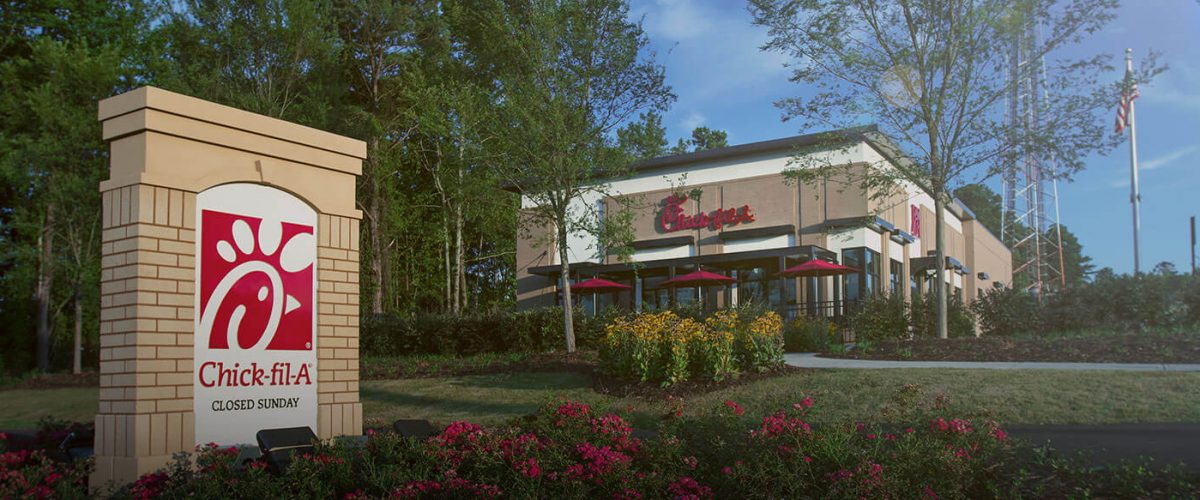A bill proposed before the New York Legislature would require Chick-fil-A to open on Sundays in their restaurants located along I-90. Or so the story goes.
Nothing creates outrage among evangelicals like rumors of persecution. The idea that Chick-fil-A — famous for its observation of the Christian sabbath — might be required to sell chicken on Sunday has created an emotional earthquake all the way to the Gulf Coast.
But there’s a bigger problem: The story isn’t true.
The proposed bill would apply only to new restaurants that sign lease agreements to operate on New York interstates. The current Chick-fil-A locations would continue to close on Sunday, as per company policy.
Just the facts
Here are the facts: The bill’s introduction was prompted by a redevelopment project under way at the New York State Thruway Authority’s 27 service areas. Through the project, 23 of the restaurant buildings at the rest stops will be rebuilt, with significant renovations on the remaining four.
Applegreen, an Irish company that operates convenience stores in Ireland, the UK and the U.S., already has signed a 33-year contract to run the rest stops, according to the proposed bill and the Thruway Authority. According to Jennifer Givner, spokesperson for the Thruway Authority, “Chick-fil-A’s Sunday closure is a brand requirement which Applegreen factored into their tenant plan.”
“Chick-fil-A’s Sunday closure is a brand requirement which Applegreen factored into their tenant plan.”
When the redevelopment project is complete, Chick-fil-A will operate in 10 of the rest stops on the Thruway. Chick-fil-A will be able to operate within their normal hours under the current contract with Applegreen and will still close on Sundays.
The Outrage Machine
But the truth of this story got outpaced by the outrage machine.
When a member of the New York Legislature introduced the bill that would require all restaurants operating along New York interstates to be open seven days a week, assumptions were made. And given the record of outrage people have about Chick-fil-A — from left and right — it was easy for this story to take wings.

Classic Chick-fil-A sandwich
This non-story about a non-issue was shared on social media and even traditional media sources. Two articles appeared on MSN. The first article was inaccurate: “New York Bill Would Force Some Chick-fil-A Locations to Open on Sundays.” The second article announced the outrage campaign: “’This Is War’: Lindsey Graham Clucks At New York Officials Over Chick-fil-A Bill.”
A member of Sen. Graham’s staff told Graham about the false story. Graham, a Southern Baptist and the senior senator from South Carolina, declared war.
Even if the story were true, there’s a good chance such a bill might not even pass. But evangelicals enjoy the pretense of persecution, which will give this story flight for months.
Whether of its own making or not, Chick-fil-A has a huge market of outraged Christians who love fried chicken.
Why so prone to outrage?
Why are Americans so prone to outrage? A steady diet of emotional arguments may be the root cause. Lauren Berlant suggests one side of our political culture has a super-charged Emotion Machine. The Emotion Machine delivers by feeling outraged and acting outraged.
“The Outrage Machine has scouts and spies everywhere.”
The Outrage Machine has scouts and spies everywhere. The task of these undercover agents is to discover an issue that doesn’t yet appear on anyone’s radar, an issue that doesn’t impact anyone, turn it into an emotional upheaval and convince the tribe of evangelicals this is an issue that threatens America and Christianity. They will soon sound like a house full of 5,000 chickens squawking at once.
In any decent outrage case, “war” remains the critical trope. The battle-tested, battle-worn evangelicals have been creating, producing and waging war since the publication of Charles Darwin’s Origin of the Species. Ken Ham, in his book The Lie: Evolution claims belief in evolution has led to abortion, lawlessness, pornography and homosexuals. David Barton swears the removal of prayer from public schools caused SAT scores to plummet. And nothing has been more specious than the lie that Americans can’t say “Merry Christmas.”
Evangelicals and other conservatives are obsessed with “wars” that aren’t really wars at all. They are always on edge looking for any excuse to blast away at liberals. They invented the war on science, the war on “wokeness,” the war on “Critical Race Theory,” the war on Christmas and the war on history.
Outrage among evangelicals always means “war.” America likes the word “war.” We have had the war on poverty, the war on drugs, the war on terrorism. We are a warrior nation. Any excuse will send us to full battle stations. Stanley Hauerwas has declared, “War is America’s central liturgical act necessary to renew our sense that we are a nation unlike other nations. America sees itself as more self-confidently patriotic and comfortable with war.”
Likely as not, evangelicals are at war about something. Here a war, there a war, everywhere a war!
Remember when evangelical pastors went on an outrage blitz about the government forcing them to perform same-sex weddings? No gay couple would ask a homophobic, vitriolic pastor to officiate their wedding in the first place. The government legalized same-sex marriage and that was the last we have heard about evangelical preachers being scared someone might ask them to officiate one.
Then the Outrage Machine fired on all cylinders in defense of all those Christian bakers being forced to make wedding cakes with two guys on the top layer dressed in tuxedos. We’ve been through gay weddings, gay wedding cakes, who can use public restrooms, what should be in textbooks, “Merry Christmas” and now fried chicken.
Capitalism and the sabbath
Even if there were a remote possibility that New York would require Chick-fil-A to open on Sundays along I-90, capitalism would take care of the situation. Either Chick-fil-A would file a lawsuit defending its right not to open on Sunday or Chick-fil-A would give up the lease. Raising Cain, Popeyes or KFC would gladly sign a lease for the space. Fried chicken will not be denied to New York travelers on Sunday.
“Even if there were a remote possibility that New York would require Chick-fil-A to open on Sundays along I-90, capitalism would take care of the situation.”
By the way, Chick-fil-A sold $5.8 billion in 2021; Raisin Cane’s $3.3 billion, KFC $6.8 billion. Selling fried chicken is a market-driven capitalistic enterprise.
Truett Cathy, the Baptist founder of Chick-fil-A, thought closing his restaurants on Sunday was good Christianity and good business. When you combine Christianity with capitalism, you get a powerful alliance.
The company’s website explains that Cathy believes “all franchised Chick-fil-A operators and their restaurant employees should have an opportunity to rest, spend time with family and friends, and worship if they choose to do so. That’s why all Chick-fil-A restaurants are closed on Sundays. It’s part of our recipe for success.”
There’s nothing here worth the fake outrage.
A better conversation
Instead of outrage, here’s a novel idea: Let’s have a deliberate, rational national conversation about the negative results created by our fast-paced, frenetic, consumption-obsessed culture. This will not be an easy sell.
Maybe we could inject voices of reason into our outrage fatigue. Walter Brueggemann, in Sabbath as Resistance: Saying No to the Culture of Now, argues nothing says secularism has conquered Christianity in America like the loss of “sabbath” as a life-principle. Sabbath is a sign of resistance and an alternative to our secular culture. As Brueggeman puts it, “It is an alternative to the demanding, chattering, pervasive presence of advertising and its great liturgical claim of professional sports that devour all our ‘rest time.’”
“Maybe we could inject voices of reason into our outrage fatigue.”
Michael Fishbane, in Sacred Attunement, claims the recovery of “sabbath” would create “mindfulness” instead of “mindlessness” in the American public.
And if we are serious about engaging critical thinking skills instead of emotional outrage, we can get together in Sunday school classes for a study of Abraham Heschel’s The Sabbath. After all, Christians stole the sabbath from the Jews and then, without biblical mandate, changed it to Sunday (a compromise for convenience).
Who on the left will engage congregations of the faithful on the fate of our greed-infested, idolatrous, secular culture void of any concept of “sabbath”? Who on the right will forsake outrage to have a symposium to create a blueprint for a sane, sensible future?
If those conversations happen on any day but Sunday, they could take place around a table of fried chicken and waffle fries at any of thousands of Chick-fil-A locations nationwide — even along the New York turnpike.

Rodney Kennedy
Rodney W. Kennedy is a pastor and writer in New York state. He is the author of 10 books, including his latest, Good and Evil in the Garden of Democracy.
Related articles:
Why I’m an LGBTQ ally who won’t boycott Chick-fil-A | Opinion by Mark Wingfield
Chick-fil-A CEO seeks to get beyond gay marriage debate
Chick-fil-A founder, Baptist layman, Truett Cathy dies


